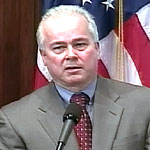Two weeks ago, the U.S. Grocery Manufacturers Association came out with a whopper that no one seems to have noticed.
In a press release intended to highlight private sector initiatives to bolster food safety – which I’m all for, they make the profit, they should shoulder the burden when they make their customers barf – GMA said,
(1).jpg) “Ultimately, wider use of third party certification/audits will reduce the risk of food-borne illnesses.”
“Ultimately, wider use of third party certification/audits will reduce the risk of food-borne illnesses.”
There is absolutely no evidence to support that statement.
In case there is some confusion, here is the statement in full:
Third party audits are an important part of America’s food safety net. To ensure rigor and integrity in third party certification, policymakers and industry leaders should encourage the engagement of auditors employed by certification bodies accredited to international standards by recognized organizations such as the American National Standards Institute (ANSI). … By increasing the number of well-qualified auditors and developing universal food safety auditing criteria, industry leaders and policymakers will ensure that auditors are competent to review a particular facility, discourage duplicative audits, reduce auditing costs, and encourage wider use of third party certification/audits throughout the food industry. Ultimately, wider use of third party certification/audits will reduce the risk of food-borne illnesses.
I’ve been hearing such statements for 15 years, and while it sounds good, I’ve seen little evidence to back such proclamations. As I’ve written before,
The third-party food safety audit scheme that processors and retailers insisted upon is no better than a financial Ponzi scheme. The vast number of facilities and suppliers means audits are required, but people have been replaced by paper. Audits, inspections, training and systems are no substitute for developing a strong food safety culture, farm-to-fork, and marketing food safety directly to consumers.
If someone barfs, they’re going to go after the biggest name they can find, whether it’s a retailer or a processor. So protect that brand. Have your own people and some institutional expertise to assess food safety risks. And avoid unsubstantiated statements.

 Bracket started out in academia, established himself at the University of Georgia, then went to government as director of the Food and Drug Administration’s Center for Food Safety and Applied Nutrition, and then to industry as senior vice president and chief science and regulatory affairs officer of the Grocery Manufacturers Association. That’s a lot of titles. And gives Bracket a credibility others can only talk about. This guy walks the talk, and has done it in various shoes.
Bracket started out in academia, established himself at the University of Georgia, then went to government as director of the Food and Drug Administration’s Center for Food Safety and Applied Nutrition, and then to industry as senior vice president and chief science and regulatory affairs officer of the Grocery Manufacturers Association. That’s a lot of titles. And gives Bracket a credibility others can only talk about. This guy walks the talk, and has done it in various shoes.